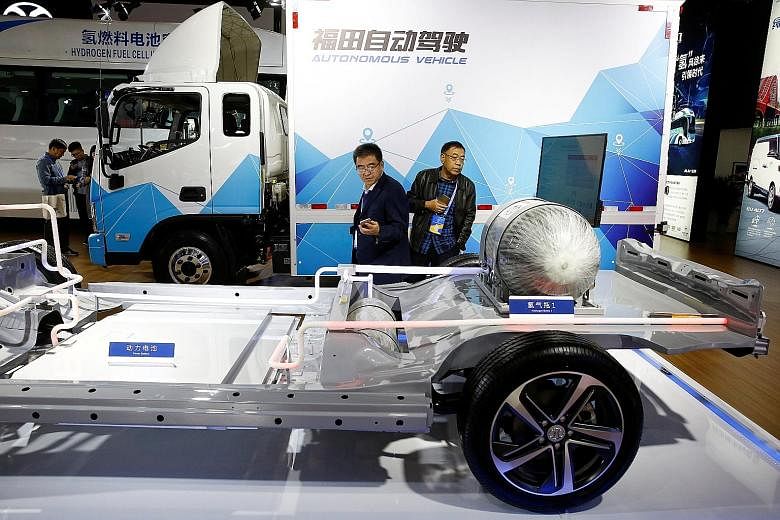BEIJING • Having just broken ground for a new factory in the southern Chinese province of Hunan, the head of electric car start-up Singulato Motors has grand plans: Build up to 50,000 electric vans per year and ride the crest of a wave for e-truck demand in China.
For a growing number of automakers operating in the world's biggest vehicle market, it is time to invest in electric vans and trucks.
They are convinced by increasingly stringent restrictions aimed at reining in pollution, generous subsidies as well as robust demand for light-duty trucks as e-commerce flourishes.
"We think China's about to see an electric commercial vehicle revolution," Singulato co-founder Shen Haiyin told Reuters. "In many ways, the EV (electric vehicle) future might arrive faster with commercial vehicles than passenger EVs."
Singulato, which is due to launch its first electric car by the middle of next year, hopes to open the e-truck plant by 2020 and quickly ramp up annual output to 50,000.
Growing momentum for e-trucks could prove to be a tipping point for the electric vehicle, first in China and eventually worldwide - encouraging the mass adoption that Tesla and other EV makers are aiming to give rise to with passenger cars.
"It's a new game," said Mr Bill Russo, head of Shanghai-based consultancy Automobility. "The advantages of electric vehicles become apparent when vehicles are deployed into transportation and logistics services fleets."
Impediments that come with electric vehicles, such as the high cost of the battery and charging needs, could, with a truck fleet, be erased to make the total cost of operation cheaper than petrol or diesel.
Batteries could be made smaller as routes are predictable, charging stations and schedules could be deployed more strategically and as trucks are often operated around the clock, economies of scale could be achieved, Mr Russo said.
Foton, part of Beijing-based BAIC Group and China's biggest maker of light-duty trucks under six tonnes, is also looking at expanding further into electric delivery vans, people with knowledge of the matter said.
Foton has some electric commercial vehicles on the market but volumes are still tiny with around 800 sold last year.
While electric trucks may not grab the public imagination in the same way Tesla's electric vehicles have done, their advent has been advocated by many auto experts.
Sceptical of the merits of the industry's rush into long-range passenger cars, they believe battery electric technology, because of its heavy weight and the limits on driving ranges, has a more natural home in short-haul trucks. That is particularly so for intra-city delivery vans and trucks plying routes that are predetermined or at least predictable.
Last year, the number of electric light-duty commercial vehicles - both all-electric and plug-in hybrids - sold in China was roughly 200,000, about 6 per cent of the market for trucks under six tonnes.
Nissan Motor, one of the first global automakers in China to develop an e-truck line-up through its venture with Dongfeng Group, believes that demand for light-duty e-trucks will quadruple in four to five years. Its joint venture, Dongfeng Motor, is aiming to lift its electric commercial vehicle sales six times to 90,000 by 2022.
Nissan's partner Renault is also on the case. Its new venture with Brilliance China Automotive Holdings plans to launch three electric delivery vans in two years, starting next year. Warren Buffet-backed BYD and Geely also have some electric trucks and vans on the market.
Growth in e-trucks fits hand in glove with efforts by Beijing and Chinese local authorities to promote electric vehicles - both to jump-start a domestic auto industry and to combat smog.
Subsidies are helping to propel the shift. Nissan's most popular electric commercial vehicle, the Dongfeng D94 van, is eligible for combined subsidies of up to about 80,000 yuan (S$15,850) from the central government and regional authorities, knocking roughly a third off its purchase price.
Nearly two dozen cities, including Beijing, Shanghai and Guangzhou, have restricted fossil-fuelled trucks from coming into city centres. Beijing, for instance, last year banned heavier trucks from entering the city centre between 6am and 11pm.
"We're betting on the e-truck because pretty soon, only e-trucks and e-vans will be allowed to enter city centres," a Nissan China executive said, declining to be identified.
"With the continued rise of e-commerce, we see a bright future in electric delivery vans."
REUTERS

